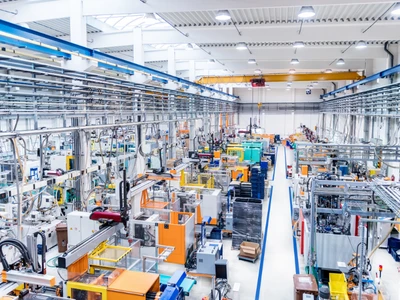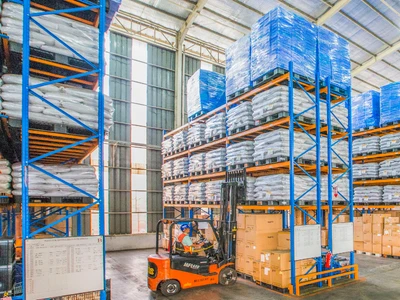A factory is where the production of goods is carried out on a large scale. Factories are used to produce a variety of products, such as food, textiles, electronics, automobiles, drugs, machinery, and many more.
Occupational safety and environmental protection are important considerations in factories, which must comply with occupational safety and environmental regulations and standards to ensure the safety of workers and protect the environment. In addition, they may also be regulated by government agencies to ensure the safety of the products they produce.

Maintaining a clean and orderly work environment is essential in any factory, as it can help ensure worker safety and improve production efficiency. Poor cleanliness can increase the risk of workplace accidents, such as slips, falls, and machinery injuries, as well as lead to health problems related to prolonged exposure to dust and air pollution. In addition, a dirty and cluttered work environment can make it difficult to identify safety problems, and reduce the efficiency of machines and equipment.
Poor cleanliness in factories can have a number of risks and negative consequences:
- Fire risk: The accumulation of dust and residues in factories can increase the risk of fire, as these materials can be highly flammable.
- Air pollution and health problems: Continuous exposure to dust and other allergens in the air can cause air pollution, which can negatively affect workers’ health, causing respiratory problems such as asthma and bronchitis, as well as skin and eye problems.
- Damage to machinery and equipment: Dust and other types of debris can damage machinery and equipment, which can increase maintenance costs and reduce factory efficiency.
- Safety issues: Waste accumulation and lack of cleanliness can create hazardous conditions for workers, increasing the risk of accidents and injuries. For example, debris on the floor can cause slips and falls.
- Productivity problems: disorganization can negatively affect efficiency and productivity, as workers may have difficulty finding and using the equipment and tools they need, and machines and equipment may not function properly due to the accumulation of dust and debris.
- Inventory problems: A dirty and cluttered factory can make inventory management and product identification difficult, increasing costs and reducing efficiency.
- Compliance issues: Poor cleaning can cause the factory to be out of compliance with occupational health and safety regulations, as well as environmental regulations, which can result in fines and other legal penalties.
Poor cleanliness in factories can have negative consequences on several aspects, including safety, health, productivity, efficiency, company image, and legal compliance, which can have a significant impact on the profitability and long-term success of the factory. It is important to take steps to ensure proper cleanliness in factories to minimize these risks and improve overall performance.
Hiring a specialized cleaning company for a factory is an excellent idea as it can help ensure a safe and clean working environment, reduce risks related to poor hygiene, improve production efficiency, comply with occupational and environmental safety regulations and standards, and provide training and advice for factory personnel. In addition, in the case of a food factory, it can help improve food safety.
A cleaning company can help eliminate the risks associated with poor hygiene in factories in several ways:
- Regular and thorough cleaning: A cleaning company can carry out regular and rigorous cleanings in the factory to ensure that dust, debris, and other unwanted substances are effectively removed. This can help reduce the risk of fires, air pollution, and health problems related to prolonged exposure to dust and debris.
- Use of specialized equipment and cleaning products: A cleaning company has access to specialized equipment and cleaning products that may be necessary to effectively and safely clean the factory. For example, they may have access to pressure washers and specific chemical cleaning products to remove grease, oil, and other contaminants.
- Handling hazardous substances: A cleaning company may have specialized experience and knowledge in handling hazardous substances, which can help ensure that they are handled safely and that related regulations and safety standards are met.
- Regulatory monitoring and compliance: A cleaning company can help ensure that the factory complies with occupational health and safety regulations, as well as environmental regulations, and they can provide documentation and records to comply with labor regulations and standards.
- Personnel training: A cleaning company can provide training for factory personnel on how to maintain a clean and safe work environment and how to safely use cleaning equipment and products.
Some additional areas where a cleaning company can help eliminate the risks associated with poor hygiene in factories include:

- Identification of risk areas: A cleaning company can conduct regular inspections to identify risk areas in the factory, such as areas with high levels of dust or debris, areas with moisture or conditions conducive to pest proliferation, or areas with unidentified hazardous substances. Once these areas are identified, the cleaning company can work to mitigate the risks by cleaning and removing hazardous substances.
- Provide disinfection services: A cleaning company can provide disinfection services for the factory since in many cases, the risk of contamination comes not only from dust and debris but also from microorganisms present in the work environment. These services can include the disinfection of common areas, disinfection of machinery, and disinfection of critical areas such as bathrooms and kitchens.
- Advice and recommendations: A cleaning company can provide advice and recommendations to improve cleanliness and safety in the factory. For example, they can provide recommendations for workspace organization, choice of cleaning products, and implementation of safe cleaning practices.
- Help improve energy efficiency: A clean and tidy factory can also improve energy efficiency, as machines and equipment can run more efficiently without the accumulation of dust and debris. This can help reduce energy costs and improve factory sustainability.
- Help improve food safety: In the case of food factories, a cleaning company can help improve food safety by implementing strict cleaning and disinfection procedures, as well as pest elimination. Cleaning experts from specialized companies will be trained to clean facilities and machinery according to food safety rules and regulations, including local, state, or federal regulations, thus ensuring that good cleaning and sanitizing practices are followed to ensure the safety of the food produced.
Another advantage of hiring a specialized company is that it can help reduce costs in the long run since the cleaning staff is professional and trained to do their job efficiently, which means less time and resources spent on cleanups, and due to less need for repairs and maintenance of damaged machinery and equipment due to accumulation of dust and debris.
Guarantee a good performance in your factory by hiring a professional cleaning service that can offer all the benefits mentioned above for your peace of mind and the optimization of your production processes, thus avoiding the risks related to poor hygiene.
